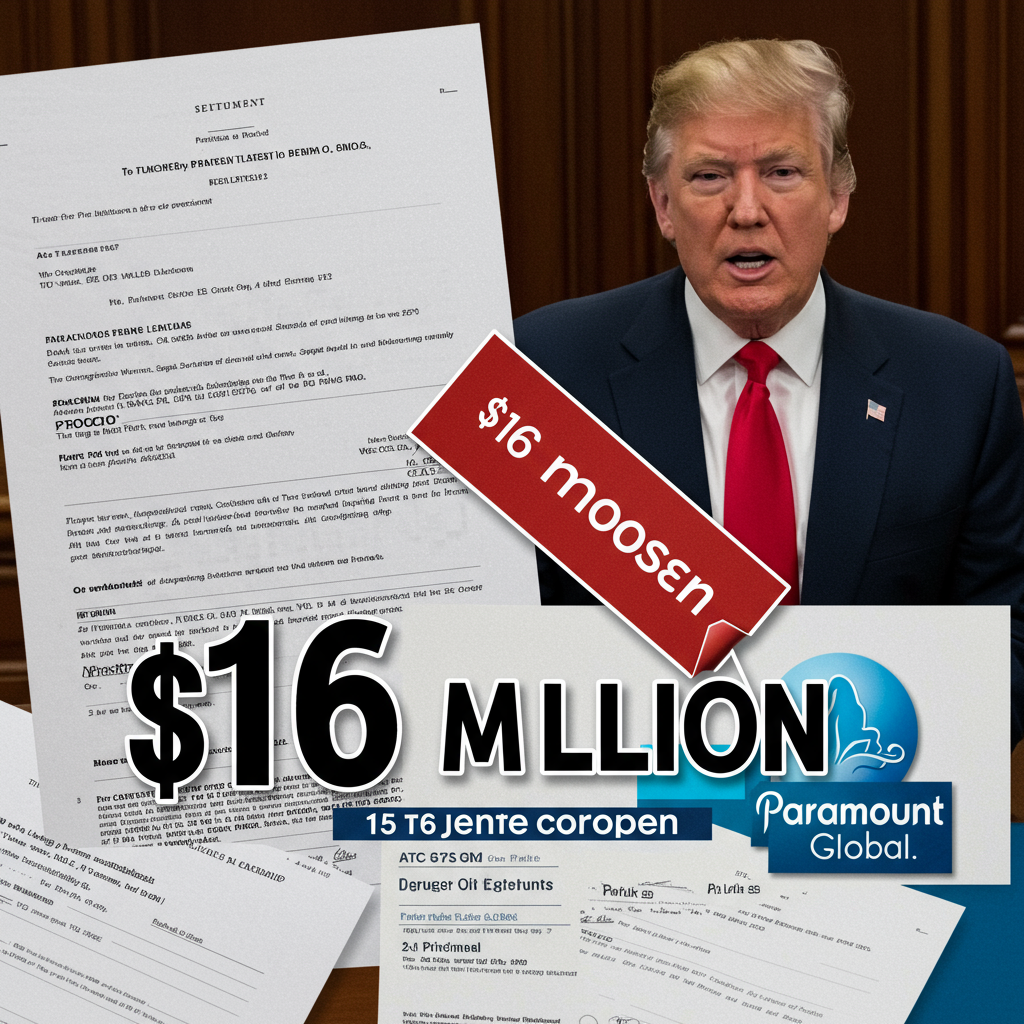In a significant development for both media and political circles, U.S. media giant paramount Global has agreed to a substantial $16 million settlement to conclude a legal challenge brought by former President Donald trump. This high-profile Paramount settlement resolves a contentious lawsuit centered on alleged editing practices during a broadcast of CBS’s renowned news program, 60 Minutes.
The agreement directs the considerable sum not to Mr. Trump directly, but specifically towards his future presidential library. This outcome follows accusations from Trump and his legal team that the network manipulated footage of an interview with then-Vice President Kamala Harris. The resolution arrives as Paramount navigates complex corporate maneuvers, notably a proposed major merger, adding another layer to the intricate settlement dynamics.
Allegations of Deceptive Editing Spark Lawsuit
Donald Trump initiated the Trump CBS lawsuit in October 2024, filing his complaint in federal court in Texas. His legal action targeted CBS, a network owned by Paramount, alleging “malicious, deceptive, and substantial news distortion.” At the heart of the grievance was a particular interview featuring Kamala Harris that aired on 60 Minutes.
Trump contended that CBS deliberately edited Harris’s comments in a misleading manner designed to unfairly benefit the Democratic party and impede his own political standing during the recent election cycle. According to the details outlined in the lawsuit, the network allegedly broadcast two different versions of Harris’s response to a specific question posed by correspondent Bill Whitaker. This question reportedly related to the Biden administration’s approach to Israel, set against the backdrop of the Israel-Gaza war.
Claims of Political Interference and ‘Mental Anguish’
The lawsuit detailed claims that one specific version of Harris’s answer, particularly the segment aired on 60 Minutes, was edited to either hide or smooth over what Trump described as a convoluted, rambling response. He argued this alleged deceptive editing served to protect Harris from potential public criticism and improperly sway voters.
Trump’s legal representatives asserted that these actions constituted “partisan and unlawful acts of election and voter interference.” The original lawsuit initially sought an astonishing $10 billion in damages. An amended complaint filed later escalated this demand significantly, reaching a staggering $20 billion. Trump also claimed the alleged edits caused him considerable “mental anguish.”
Paramount’s Defense and Journalistic Stance
Throughout the legal proceedings, CBS and its parent company, Paramount, maintained a strong defense of their journalistic integrity. The network consistently labeled the lawsuit as “completely without merit.”
CBS asserted that the editing of Harris’s interview was standard practice in television news production, performed solely to meet necessary time constraints. The network forcefully rejected any suggestions of deception, clearly stating that the broadcast was “not doctored or deceitful.” They had previously sought to have the case dismissed by a judge, citing First Amendment protections which offer journalists broad discretion regarding content selection and presentation.
Terms of the $16 Million Agreement
After months of intense legal exchanges, including a period of court-ordered mediation that began in April 2025, the parties finally reached a Paramount settlement. Paramount Global publicly confirmed the agreement, specifying a $16 million payment to resolve all outstanding claims.
A crucial condition of this Paramount settlement is the mandated destination of the funds. The $16 million is designated exclusively for Donald Trump’s future presidential library. The agreement explicitly prohibits the money from being paid directly or indirectly to Mr. Trump himself or the co-plaintiff listed, U.S. Rep. Ronny Jackson. This structure mirrors settlements seen in other recent legal disputes involving Trump and media companies.
Importantly, Paramount’s statement confirming the settlement also made it clear that the agreement contains no statement of apology or expression of regret from the company regarding its handling of the interview footage. The $16 million settlement amount is also understood to cover Trump’s legal fees associated with pursuing the case.
A Commitment to Future Transparency
Beyond the financial component, the settlement also includes a significant agreement impacting future journalistic operations. Paramount committed that 60 Minutes will release transcripts of interviews conducted with future eligible U.S. presidential candidates after their broadcasts. While these transcripts will be subject to redactions for legal or national security requirements, this term directly addresses concerns about the full context of candidate interviews raised by Trump’s lawsuit. This commitment aims to increase transparency in a key area of political reporting.
The Merger Imperative: Clearing the Regulatory Path
While avoiding a potentially lengthy and costly trial was a factor, reports indicate that a primary motivation behind Paramount agreeing to the settlement was its critical timing related to the company’s major business objectives. Paramount Global is actively pursuing a proposed $8.4 billion merger with Skydance Media. This complex transaction requires official approval from the U.S. Federal Communications Commission (FCC), a key federal regulatory body.
The ongoing lawsuit had become a significant impediment to the FCC review process for the proposed merger. Notably, the Trump-appointed FCC Chairman, Brendan Carr, had opened an inquiry specifically into whether the 60 Minutes edits constituted “news distortion.” This inquiry presented a direct threat to holding up the regulatory green light necessary for the merger to proceed.
Removing a Major Obstacle
Multiple news reports suggest that the settlement was actively pursued, with the aid of a mediator, specifically to eliminate this substantial hurdle to the Skydance deal. Both Paramount’s controlling shareholder, Shari Redstone, and executives at Skydance reportedly exerted pressure for a swift resolution to facilitate the merger’s progression.
The context of seeking regulatory approval, coupled with a large payment made to a former president who holds sway within the political and regulatory landscape, reportedly raised concerns among some lawmakers and regulatory experts. Theories were even floated that such a settlement could be interpreted as potentially akin to ‘bribery’ – a payment made to resolve an issue hindering government approval. Paramount, however, maintained that it treated the lawsuit independently from the Skydance transaction and the FCC process. Nevertheless, the settlement now clears a significant obstacle, allowing the essential FCC review to advance.
Internal Disruption and External Criticism
The contentious Trump CBS lawsuit and the eventual settlement process were not without consequences within CBS News. Sources indicate the dispute contributed to significant internal turbulence and reportedly led to the departures of key executives. This included figures like CBS News and Stations president Wendy McMahon and 60 Minutes executive producer Bill Owens.
Some departures were reportedly linked to reluctance among executives to issue any form of apology to Mr. Trump as part of a settlement. There were also concerns expressed regarding increased corporate oversight, driven by the urgency to secure regulatory approval for the Skydance deal, potentially impacting journalistic independence and autonomy.
The Paramount settlement also drew sharp criticism from external observers, including experts on the First Amendment and advocates for press freedom. Organizations like the Freedom of the Press Foundation reportedly denounced the lawsuit itself as frivolous. They viewed the settlement as a troubling instance of a major media company yielding crucial First Amendment ground under financial and regulatory pressure. Critics framed the substantial payout as a potential “shake-down” and warned that it could set a concerning precedent for future legal challenges brought against news organizations.
Trump’s Response and Broader Pattern
A spokesman for Donald Trump’s legal team was quick to characterize the settlement as a clear victory. In a public statement, the spokesman hailed the outcome as “another win for the American people,” asserting that Trump had successfully held “the Fake News media accountable for their wrongdoing and deceit.” The statement further claimed that CBS and Paramount had “realised the strength of this historic case” and had been left with “no choice but to settle.”
This Paramount settlement fits within a larger, well-documented pattern of former President Trump frequently targeting media outlets with legal actions over coverage he deems unfair, false, or misleading. His history includes persistent public criticism, threats against broadcast licenses, and multiple legal filings.
Other Recent Media Settlements
The agreement with Paramount is the latest in a series of settlements reached between Trump and major media entities:
ABC News: Walt Disney-owned ABC News settled a defamation case brought by Trump. This settlement, made public in December 2024, reportedly involved a $16 million payment (also directed to his presidential library plus legal fees). It notably included a public apology from the network for inaccurate comments made by anchor George Stephanopoulos related to a civil judgment against Trump.
Meta Platforms: In January 2025, Meta Platforms, the parent company behind Facebook and Instagram, agreed to pay approximately $25 million to settle a lawsuit filed by Trump concerning the suspension of his social media accounts following the events of January 6, 2021.
While some outlets have chosen to settle, others have opted to litigate Trump’s legal challenges, such as an ongoing lawsuit against the Des Moines Register newspaper concerning their polling methods. Mr. Trump has reportedly vowed to continue pursuing further legal claims against various media organizations he perceives as having wronged him.
Frequently Asked Questions
What was Donald Trump’s lawsuit against CBS and Paramount about?
Donald Trump’s lawsuit against CBS, owned by Paramount Global, alleged that the network engaged in deceptive editing during a 60 Minutes interview with then-Vice President Kamala Harris that aired in October 2020. Trump claimed the editing of Harris’s response to a question about the Israel-Gaza conflict distorted her answer, concealed a perceived weakness, and was done with the intention of unfairly influencing the election in favor of the Democratic party. He initially sought $10 billion, later increasing his demand to $20 billion in damages for what he termed “news distortion” and election interference.
Where is the $16 million from the Paramount settlement going?
The $16 million payment agreed upon as part of the Paramount settlement with Donald Trump is strictly designated for his future presidential library. The terms of the agreement explicitly state that the funds will not be paid directly or indirectly to Mr. Trump or any co-plaintiff involved in the case. This amount also covers Trump’s legal fees incurred during the course of the lawsuit against CBS and Paramount.
Why did Paramount agree to settle the lawsuit?
Paramount agreed to settle the lawsuit primarily to avoid the potentially significant costs, time investment, and risks associated with taking the case to trial. Crucially, the settlement removed a major regulatory obstacle to the company’s proposed $8.4 billion merger with Skydance Media. The lawsuit, and the related inquiry into “news distortion” opened by the FCC which must approve the merger, had effectively stalled the regulatory review process. Settling cleared this path, allowing Paramount to move forward with its critical business transaction. Paramount stated the agreement did not include an apology.
Conclusion
The $16 million settlement between Paramount Global and Donald Trump brings to a close a highly contentious legal conflict stemming from alleged deceptive editing of a 60 Minutes interview. While resolving the immediate dispute and notably clearing a critical path for Paramount’s planned merger with Skydance Media by addressing an FCC review impediment, the agreement leaves complex questions lingering.
This resolution, which directs funds to Trump’s presidential library without requiring a corporate apology, represents another chapter in the ongoing debate surrounding the intricate relationship between media independence, political pressure, and the significant financial implications of legal challenges against powerful figures in the news landscape. As Paramount moves forward with its strategic business plans, this Paramount settlement stands as a notable instance in the recurring pattern of legal confrontations between the former president and the news organizations responsible for covering him.




